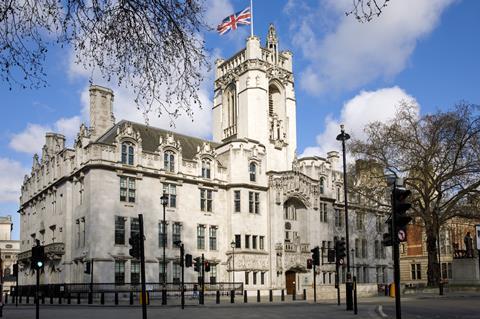Courts must avoid the risk of unduly interfering with political choices when hearing challenges against the government, the president of the Supreme Court said today in a judgment dismissing a challenge to a limit on the number of children for which a state benefit may be claimed.
In R (on the application of SC, CB and 8 Children) v Secretary of State for Work and Pensions and ors, the UK’s highest court rejected arguments that the two-child limit for child tax credit, which came into force in 2017, was incompatible with the rights of adults and children under articles 8 and 12 of the European Convention on Human Rights.
Lord Reed said: ‘The democratic credentials of the measure could not be stronger. It was introduced in parliament following a general election, in order to implement a manifesto commitment. It was approved by parliament, subject to amendments, after a vigorous debate at which the issues raised in these proceedings were fully canvassed, and in which the body supporting the appellants was an active participant. There is no basis, consistent with the separation of powers under our constitution, on which the courts could properly overturn parliament’s judgment that the measure was an appropriate means of achieving its aims.’

Lord Hodge, Lady Black, Lord Lloyd-Jones, Lord Kitchin, Lord Sales and Lord Stephens agreed.
In a strong statement against public law actions, Lord Reed said challenges to legislation on the grounds of discrimination have become increasingly common. 'They are usually brought by campaigning organisations which lobbied unsuccessfully against the measure when it was being considered in parliament, and then act as solicitors for persons affected by the legislation, or otherwise support legal challenges brought in their names, as a means of continuing their campaign.
'The favoured ground of challenge is usually article 14, because it is so easy to establish differential treatment of some category of persons, especially if the concept of indirect discrimination is given a wide scope. Since the principle of proportionality confers on the courts a very broad discretionary power, such cases present a risk of undue interference by the courts in the sphere of political choices. That risk can only be avoided if the courts apply the principle in a manner which respects the boundaries between legality and the political process.’
Public law barrister Donnchadh Greene, of Doughty Street Chambers, said on Twitter: 'This is an extremely worrying paragraph from the president of the Supreme Court whose role is to ensure that parliament acts within the law. Campaign groups and solicitors form an important part of this mechanism and should not be cast in a negative light for doing so.'



























10 Readers' comments